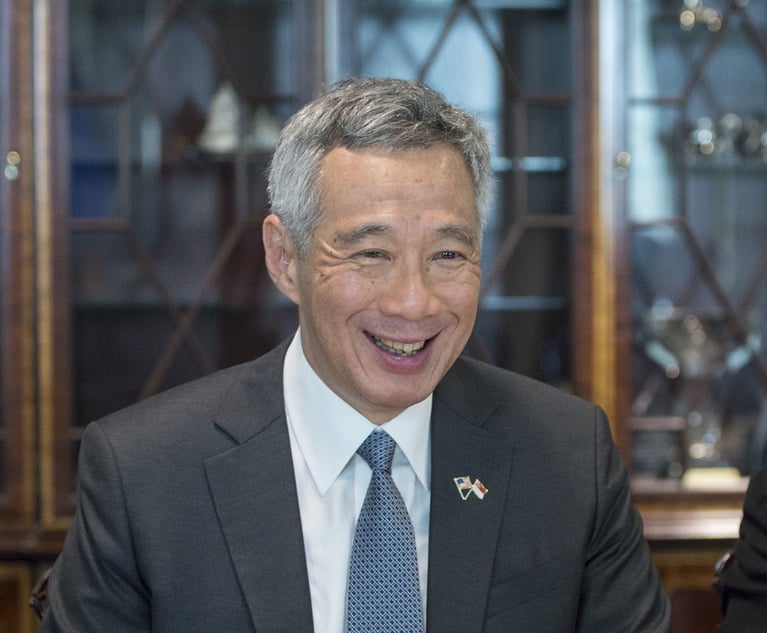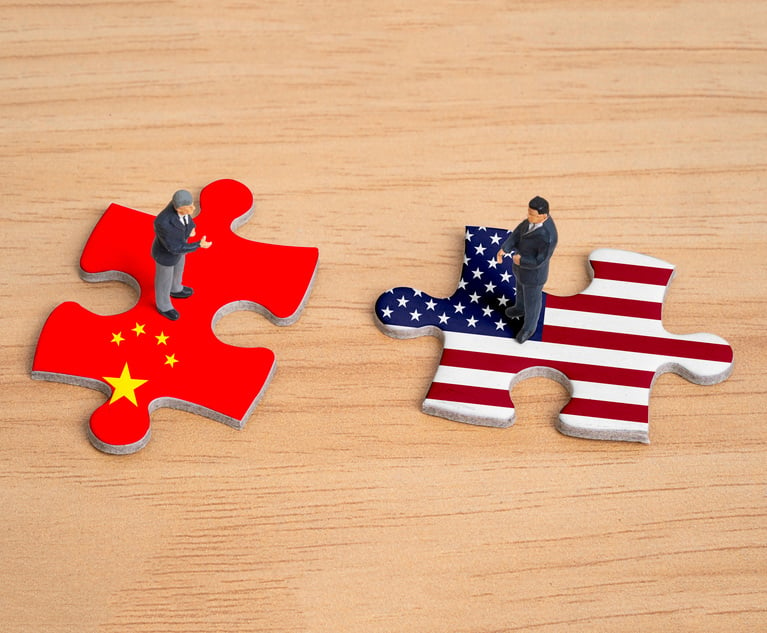Asia lawyers forecast market upturn after landmark leadership changeover in China
International law firms in Asia are eyeing an increase in market activity following the change in China's leadership, citing a possible return to investment by the country's largest companies. This month saw the confirmation of Xi Jinping as China's new president, succeeding Hu Jintao after almost 10 years at the top of the Communist Party. Jintao's presidency will formally come to an end in March next year, with many lawyers in the region believing the succession will lead to a revival in work levels.
November 29, 2012 at 07:03 PM
4 minute read
Once-in-a-decade China leadership shift prompts hopes of revival for corporate and capital markets
International law firms in Asia are eyeing an increase in market activity following the change in China's leadership, citing a possible return to investment by the country's largest companies.
This month saw the confirmation of Xi Jinping as China's new president, succeeding Hu Jintao after almost 10 years at the top of the Communist Party. Jintao's presidency will formally come to an end in March next year, with many lawyers in the region believing the succession will lead to a revival in work levels.
"The leadership change is good news," said Ashurst Asia head Geoffrey Green (pictured). "Everyone has been waiting, hoping that the markets, in particular the equity capital markets, will get better after the Chinese new year."
Other international firms in the region say the run-up to the change in power has resulted in a slowdown in corporate and capital markets work, with many companies postponing investment plans ahead of potential policy changes.
"There hasn't been a lot of movement in the market, partially because people have been holding off, waiting for the change in government," said Li He, Davis Polk & Wardwell Beijing corporate partner.
"The big state-owned enterprises are heavily influenced by national economic policies, so they may have had capital raising and acquisition plans, but they have been waiting for the changeover to take place and see whether there will be any drastic changes to fundamental policies."
David Eich, founding partner of Kirkland & Ellis' Hong Kong office, also cited uncertainty ahead of the changes: "While the role of government in Chinese transactional activity remains very important, it's been more about the transition itself than the particular group or policy.
"Like the US elections, the change in leadership consumes a lot of energy and creates uncertainty in business, and that tends to encumber transactional activity."
On the policy side, lawyers believe another key long-term impact on the profession could be an overhaul of the judicial system in March, which is set to see the appointment of a new president of the Supreme People's Court.
According to media reports, the country is preparing to appoint its first lawyer – Hunan party chief Zhou Qiang – to head the court, a move which could lead to more lawyers moving into senior positions within China's legal system.
"What will matter more to the legal market will be a change in the chief judge of the Supreme Court," said Rae Yan, an intellectual property partner at Hogan Lovells in Beijing.
"In my opinion, this change will have a bigger impact than the change in leadership of the country. In the past few years, judgments have been quite political. The expected new chief judge understands more about law. So hopefully, that will [create] a good trend."
The new members of the Politburo Standing Committee – China's supreme government body – were also revealed this month, with Li Keqiang succeeding Wen Jiabao as premier. The committee, which will lead China for the next decade, was reduced from nine to seven members, with most viewed as being politically conservative.
According to Citigroup economists, the change in leadership represents a move towards business and stability. Among the new members of the committee, six have previously been employed in coastal areas as provincial governors or party heads, while four worked in the countryside during Mao Zedong's reign, hinting at a pro-enterprise approach.
This content has been archived. It is available through our partners, LexisNexis® and Bloomberg Law.
To view this content, please continue to their sites.
Not a Lexis Subscriber?
Subscribe Now
Not a Bloomberg Law Subscriber?
Subscribe Now
NOT FOR REPRINT
© 2025 ALM Global, LLC, All Rights Reserved. Request academic re-use from www.copyright.com. All other uses, submit a request to [email protected]. For more information visit Asset & Logo Licensing.
You Might Like
View All
Singapore Leaders Stress the Importance of the Rule of Law Amid Geopolitical Tensions

Can Law Firms Avoid Landing on the 'Enemy' List During the Trump Administration?
5 minute read

Letter From Asia: Will Big Law Ever Bother to Understand Asia Again?
Trending Stories
Who Got The Work
J. Brugh Lower of Gibbons has entered an appearance for industrial equipment supplier Devco Corporation in a pending trademark infringement lawsuit. The suit, accusing the defendant of selling knock-off Graco products, was filed Dec. 18 in New Jersey District Court by Rivkin Radler on behalf of Graco Inc. and Graco Minnesota. The case, assigned to U.S. District Judge Zahid N. Quraishi, is 3:24-cv-11294, Graco Inc. et al v. Devco Corporation.
Who Got The Work
Rebecca Maller-Stein and Kent A. Yalowitz of Arnold & Porter Kaye Scholer have entered their appearances for Hanaco Venture Capital and its executives, Lior Prosor and David Frankel, in a pending securities lawsuit. The action, filed on Dec. 24 in New York Southern District Court by Zell, Aron & Co. on behalf of Goldeneye Advisors, accuses the defendants of negligently and fraudulently managing the plaintiff's $1 million investment. The case, assigned to U.S. District Judge Vernon S. Broderick, is 1:24-cv-09918, Goldeneye Advisors, LLC v. Hanaco Venture Capital, Ltd. et al.
Who Got The Work
Attorneys from A&O Shearman has stepped in as defense counsel for Toronto-Dominion Bank and other defendants in a pending securities class action. The suit, filed Dec. 11 in New York Southern District Court by Bleichmar Fonti & Auld, accuses the defendants of concealing the bank's 'pervasive' deficiencies in regards to its compliance with the Bank Secrecy Act and the quality of its anti-money laundering controls. The case, assigned to U.S. District Judge Arun Subramanian, is 1:24-cv-09445, Gonzalez v. The Toronto-Dominion Bank et al.
Who Got The Work
Crown Castle International, a Pennsylvania company providing shared communications infrastructure, has turned to Luke D. Wolf of Gordon Rees Scully Mansukhani to fend off a pending breach-of-contract lawsuit. The court action, filed Nov. 25 in Michigan Eastern District Court by Hooper Hathaway PC on behalf of The Town Residences LLC, accuses Crown Castle of failing to transfer approximately $30,000 in utility payments from T-Mobile in breach of a roof-top lease and assignment agreement. The case, assigned to U.S. District Judge Susan K. Declercq, is 2:24-cv-13131, The Town Residences LLC v. T-Mobile US, Inc. et al.
Who Got The Work
Wilfred P. Coronato and Daniel M. Schwartz of McCarter & English have stepped in as defense counsel to Electrolux Home Products Inc. in a pending product liability lawsuit. The court action, filed Nov. 26 in New York Eastern District Court by Poulos Lopiccolo PC and Nagel Rice LLP on behalf of David Stern, alleges that the defendant's refrigerators’ drawers and shelving repeatedly break and fall apart within months after purchase. The case, assigned to U.S. District Judge Joan M. Azrack, is 2:24-cv-08204, Stern v. Electrolux Home Products, Inc.
Featured Firms
Law Offices of Gary Martin Hays & Associates, P.C.
(470) 294-1674
Law Offices of Mark E. Salomone
(857) 444-6468
Smith & Hassler
(713) 739-1250








